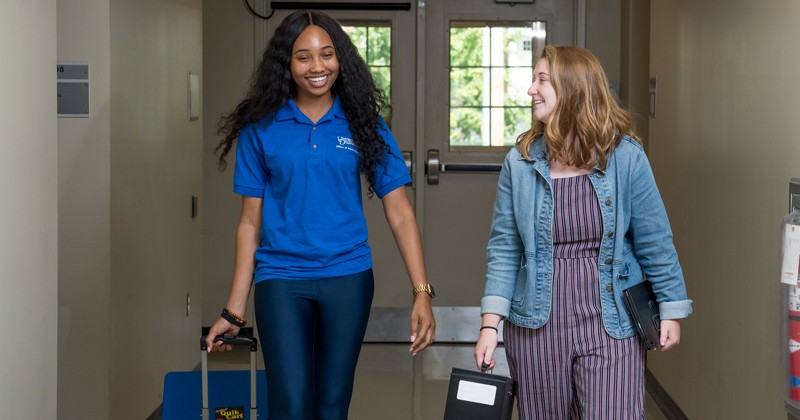Tracking Characteristics for Success

Colleen Mueller and Khadi Jackson shine a light on substance abuse recovery residences
Colleen Mueller is a University of Delaware senior from Old Lyme, Connecticut who is majoring in human services with a concentration in clinical services. Khadi Jackson is sophomore human services major and urban education minor from Newark, Delaware. We caught up with them to learn about the important work they are doing to understand characteristics that can potentially lead to substance abuse recovery among people living in sober living homes.
Q: What are you studying, where and with whom?
Mueller: We are working with Dr. Jennifer Carrano to determine the most effective characteristics of recovery residences to promote and support sobriety.
Jackson: Our study aims to help those who are suffering from substance abuse. Substance abuse is the overuse/misuse of drugs and or alcohol. Recovery residences, or sober living homes, are already a potentially really helpful resource that offers people a long-term, community-based treatment option with services that increase the likelihood of long-term recovery. This study is focused on tracking various characteristics that can potentially lead to substance abuse recovery among people living in sober living homes.
Q: What inspired this project and what interests you most about this topic?
Mueller: The project was inspired by the need to accurately address the problem of substance use disorders statewide and the lack of current research on the effectiveness of recovery residences. By trying to find new information, we can appropriately address the need for positive experience within sober homes and hopefully use our research to implement new strategies for increasing rates of sobriety. With the information gained from our research we hope to learn new methods for promoting the social well-being of the individual in recovery.
Jackson: What interests me most about this topic is how we get to see data that will potentially help improve the services offered to those in sober living homes. The misuse of drugs and alcohol is a huge epidemic that affects many communities. In the future I hope to work in youth and urban development. Working on this study since second semester freshman year gives me insight into my major and helps diversify my interests. I am able to see potential different career paths through the lens of this study.
Q: What is a typical day like?
Mueller: I work closely with our graduate research assistants to track study participants and make sure their survey responses are appropriately documented and to keep the project running smoothly. I like to think of myself as a helping hand on this project. Dr. Carrano and our team are always teaching me about the world of scientific research, as well as supporting my desire to try new things. I am very fortunate to have such supportive colleagues on such a potentially life-changing project.
Jackson: In addition to administrative work, such as reaching out to various people to take their surveys, uploading data and getting ready for future visits, one week out of each month I do house visits for data collection. During these site visits, I go into the sober living homes that are a part of our study and administer the surveys there. The participants gather around, typically at a table or one general location and the research assistants administer the surveys on tablets that are provided through our survey. Upon completion, participants receive a $10 gift card of their choice.



